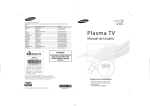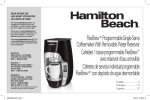Download Melissa Hot Beverage Maker Operating instructions
Transcript
P.O. Box 307, Mankato, KS 66956 www.rollinghills.coop ROLLING HILLS E L E C T R I C C O O P E R AT I V E NEWS Rolling Hills Electric Cooperative, Inc. Douglas Jackson–General Manager Board of Trustees Gary Frieling, Athol President–District 2 Kenneth Becker, Sylvan Grove Vice President–District 1 Kevin Cromwell, Haddam Secretary–District 3 Bernard Bohnen, Dorrance Treasurer–District 1 Bryan Boyles, Burr Oak Trustee–District 2 Leon Eck, Tipton Trustee–District 2 Jim Ehrlich, Wilson Trustee–District 1 Melroy Kopsa, Cuba Trustee–District 3 Jay Overmiller, Lebanon Trustee–District 2 Justin Trost, Concordia Trustee–District 3 District Offices District 1–Ellsworth 208 W. First Street P.O. Box 125 Ellsworth, KS 67439-0125 785-472-4021 District 2–Mankato 122 W. Main P.O. Box 307 Mankato, KS 66956-0307 785-378-3151 District 3–Belleville 2305 US 81 Hwy P.O. Box 309 Belleville, KS 66935-0309 785-527-2251 Trustee Election & Bylaws Amendments Results Rolling Hills Electric Cooperative, Inc., members voted by mail ballot in December for open Trustee positions in each district and on potential Bylaws amendments. Below are the results of the Trustee elections: f District 1 KENNETH BECKER–184 votes ROBERT A. FREDRICKSON–210 votes Write-in candidates–4 votes f District 2 BRYAN BOYLES–305 votes PAUL R. WILSON–507 votes f District 3 JUSTIN TROST–369 votes Write-in candidates–2 votes The cooperative congratulates Mr. Fredrickson, Mr. Wilson, and Mr. Trost. These Trustees will serve three-year terms. The cooperative thanks Mr. Becker and Mr. Boyles for their years of dedicated service to the members of Rolling Hills Electric. Cooperative members also voted on potential Bylaws amendments. The results are: f Question 1: Should the cooperative amend Bylaw Section 4.04 to provide term limits for Trustees? YES: 1,105 votes NO: 451 votes f Question 2: If the majority of cooperative members were to vote in favor of term limits, which of the term limit amendment options to Bylaw Section 4.04 should be adopted? OPTION 1: 734 votes OPTION 2: 744 votes A majority vote is required to amend the Bylaws. The majority of members voted “yes” on question 1 and for option 2 on question 2. The Bylaws are now amended to add Trustee term limits as follows: “A Trustee may serve no more than four (4) successive three-year terms, provided that he or she is duly nominated by the nominating committee, or otherwise placed on the ballot as permitted by the Bylaws of the organization, and re-elected by the Members at the conclusion of each successive term. Current Trustees who have exceeded these limits of service will not be eligible for re-election to the Board of Trustees after their current term expires.” The following incumbent Trustees Continued on page 16-B f Counting the Ellsworth District ballots commenced at 8:30 a.m. on January 6. Committee members were (from left) Matthew Theilen, Dorrance; Patrick Hoffman, Atty; Vera Ehrlich, Wilson; and Machelle Brokes, Wilson. FEBRUARY 2015 KANSAS COUNTRY LIVING 16-A N E W S F R O M R O L L I N G H I L L S E L E C T R I C C O O P E R AT I V E Heat Pump Tax Credits Available Good news! There is a 30 percent geothermal tax credit (for the price of the complete system) when using qualified geothermal heat pumps. There is no maximum limit, which means you can spend as much as you want on your geothermal system and you will still get 30 percent back. This federal incentive was created in 2008 with the Energy Improvement and Extension Act of 2008 (H.R. 1424). ff When does this incentive expire? You can apply for this 30 percent federal geothermal tax credit for systems which are placed in service by December 31, 2016. ff What qualifies? Existing homes as well as new construction qualify. Primary residences and second homes also qualify. Rentals do not qualify. ff What are the requirements? All ENERGY STAR geothermal heat pumps qualify for the tax credit. ff Where can I find out more about the 30 percent geothermal energy federal tax credit? For more information please visit EnergyStar.gov. Roestis Welcome New Addition TYLER and JENN ROESTI, rural Geneseo, announce the birth of their son, COOPER LEE ROESTI. Cooper was born at Salina Regional Health Center on December 1. He weighed 8 lbs 1 oz and was 21-inches long. Cooper Lee Grandparents are Roesti Randy and Melissa Schneider, Kanopolis, and Jerry and Bobette Roesti, Mankato; great-grandmother Paula Schneider, Kanopolis, great-grandfather, Chant Koralek, Ellsworth, great-great grandmother, Lillian Campbell, Ellsworth. Tyler is a Journeyman Lineman in the Ellsworth District and Grandpa Jerry Roesti is a Journeyman Lineman, in the Mankato District. Rolling Hills Electric congratulates the Roesti family. 16-B KANSAS COUNTRY LIVING FEBRUARY 2015 Trustee Election & Bylaws Amendments Results Continued from page 16-A will not be eligible for re-election at the conclusion of their current term: ff GARY FRIELING, President, District 2, Athol ff KEVIN CROMWELL, Secretary, District 3, Haddam ff BERNARD “SONNY” BOHNEN, District 1, Dorrance ff LEON ECK, District 2, Tipton ff MELROY KOPSA, District 3, Cuba ff JAY OVERMILLER, District 2, Lebanon Members voted to add a new Bylaw by a vote of 1,075 “yes” to 455 “no” votes. The new Bylaw addresses availability of minutes and member attendance at Board of Trustee meetings. It has been policy since the cooperative was established in 2002 for meeting minutes to be taken at all meetings of the Board of Trustees. Meeting minutes are reviewed, discussed if necessary, and approved at the next Board meeting. A Board meeting summary is posted on the cooperative website within a few days after each meeting. This was started in March 2014 in response to member requests for information. Although not the official approved minutes, the Board summary is available within a few days to inform members about Board work. A Rolling Hills member may obtain a copy of the most recent approved Board meeting minutes at any office by simply making the request and showing identification, as specified in Policy I-16. The Board reviewed and revised this policy to provide easier member access to certain generally available information. Under the new Bylaw, minutes as approved at the next regular Board meeting will be made available, upon request, to members at any office within two business days following the next regular Board of Trustees meeting. Also policy since 2002, a member may request to attend a Board meeting by submitting a written statement of the business to discuss, who will attend, and time needed. Under the new Bylaw, members shall be permitted to attend regular or special meetings of the Board of Trustees, (excluding executive sessions) by providing at least two business days prior written, faxed, or E-mailed notice to an office of the intent of the member to attend the meeting. Members attending a Board of Trustees’ meeting shall not be disruptive or interfere with the normal and scheduled proceedings of the Board of Trustees. Members in attendance shall not be permitted to speak unless placed on the agenda, during an open forum, or upon request of the President of the Board of Trustees. Cooperative Bylaws and Board policies are posted on the website at www.rollinghills.coop. Rolling Hills Electric RadioShack to Close Prices Marked for Liquidation in February Due to poor performance the last few years after losing DirecTV and Alltel, the Board and management feel it is in the best interest of the cooperative to close the Ellsworth RadioShack. During February, the price of products will be reduced for quick liquidation. The closure of the store will not affect the number of personnel. Hours during February will be Monday through Friday, 9 a.m. to 5 p.m. and Saturdays, 8 a.m. to noon. Know How to Use Your Generator Safely One way to meet the challenge of a power outage head on is with a generator. Generators can help you get by until your utility gets your power restored. If you are in the market for a new generator, below are tips to help you make sure the generator you are buying is right for your needs: f Before anything else, you need to think about site selection–where you will put a generator (an outdoor location that is in a dry area and on a level surface). f Then, you should decide if a portable generator will meet your needs during an outage. A portable generator simply cannot meet all your electric needs. You must decide what electronics would be most important during a power outage. Add up the wattage of these appliances. Your generator should have more output than the wattage of your require electronics. This way, the generator will be able to create the extra electricity it takes to start up some appliances. f An alternative to the portable generator is a permanent generator. These generators are wired directly into your home by a qualified electrician. After making the correct purchase, operating your generator safely is crucial follow these tips when operating your generator: f Read and follow all manufacturer operating instructions to properly ground the generator. Be sure you understand them before hooking up the generator. f To prevent back feed, standby generators should have a transfer safety switch installed by a professional and portable generators should never be plugged directly into a home outlet or electrical system–use an extension cord to plug appliances into an outlet on the generator to power them. f Never operate a generator in a confined area, such as a garage. Generators can produce numerous gases, including toxic and deadly carbon monoxide. They require proper ventilation. f Generators pose electrical risks especially when operated in wet conditions. Use a generator only when necessary when the weather creates wet or moist conditions. Protect the generator by operating it under an open, canopy-like structure and on a dry surface where water cannot form puddles or drain under it. Always ensure that your hands are dry before touching the generator. f When you refuel the generator, make sure the engine is cool to prevent a fire, should the tank overflow. f There should be nothing plugged into the generator when you turn it on. This prevents a surge from damaging your generator and appliances. f Be sure to keep children and pets away from the generator, which could burn them. For more safety information on the safe operation generators, visit SafeElectricity.org. Give Heaters Some Space and Your Blankets a Break For many in the wintertime, a simple way to save money and stay warm means turning down the furnace and plugging in space heaters and electric blankets. However, the Rolling Hills program urges consumers to use these devices with caution. According to a National Fire Protection Association study, in 2010 space heaters accounted for 32 percent of the 57,100 reported home fires and 80 percent of deaths caused by home heating equipment. In September 2012, the Chicago Tribune reported the death of a two-month old baby girl. A space heater placed too close to the bed sparked a fire in the apartment, which reportedly had nonworking smoke alarms. Prevent tragedies such as this by using the following guidelines to operate space heaters safely: ff Many fires start when flammable products are placed too close to heating devices, such as space heaters. Space heaters should be kept at least three-feet from blankets, clothing, paper, and other flammables. ff Place space heaters out of high-traffic areas and on a level, hard, non-flammable floor surface–NOT on carpets, furniture, or countertops. ff Look for a space heater that has guards from heating elements and automatically shuts off if it is tipped over or overheating. ff Do not attempt to warm your entire home using only space heaters. Space heaters are useful in small areas, such as a study or living room. However, if you need to keep large areas warm, your home heating system will do the job more efficiently. ff Plug space heaters directly into the outlet, and never use an extension cord. ff For the safe use of electric blankets, Rolling Hills offers the following tips: ff Only use electric blankets with an automat- ic shut off designed to prevent the blanket from overheating. ff Pets should never be allowed to sleep on top of electric blankets. ff Electric blanket wires should never be bent or tucked under a mattress. ff Replace old or damaged electric blankets. The blanket should not have any charred or dark areas. Check space heaters and electric blankets before use. Cords should not be frayed, brittle, or cracked. Always remember to turn off space heaters and electric blankets when not in use. Never leave one of these devices on unattended or after going to bed. To learn more on how to avoid electrical hazards, visit SafeElectricity.org. FEBRUARY 2015 KANSAS COUNTRY LIVING 16-C ENERGY EFFICIENCY TIPS Coffee’s On, But Don’t Forget to Turn it Off There’s nothing like a piping hot beverage or cup of coffee on a cold winter day! Preparation of hot liquid refreshments is a daily creature comfort enjoyed by millions of Americans. We simply need water, coffee (tea, etc), an energy source for heat, an appliance and a cup. Within minutes, we’re transferring heat generated from one resource to another–our bodies. Ah! And when it comes to preparing these hot beverages, we’ve come a long way from the days of percolating coffee upon a wood-fired cook stove. Thanks to electricity, there are countless appliances and methods for concocting hot beverages. The drip-style coffee maker became a household staple in the 1970s and is still among the most popular kitchen appliances. The new kid on the block is the singleserve hot beverage maker. The singleserve gadget uses a small disposable plastic cup filled with ground coffee, hot chocolate, tea, and even cider. The U.S. Department of Energy A thermal image of the back of our office’s single-serve coffee maker reveals that the unit is producing nearly 110 degrees of heat gain to the room. reports that nearly 11 cents from every dollar spent on energy is for miscellaneous appliances, devices and gadgets. Coffee machines and hot beverage makers fall into this category. An oftenoverlooked fact is most consumer appliances generate heat while in use and some continue to generate heat even while sitting idle. Furthermore, when appliances are used inside the home, their heat output, or British Thermal Units (BTUs), is considered heat gain. Heat gain from appliances during winter months is a welcome by-product. However, circumstances change in the summer when our air conditioners must run even more to remove the heat generated from appliance usage. Images from an infrared camera are a great way to see heat loss from appliances. The infrared photo on this page is of the single-serve coffee maker at my office, which stays on throughout the day to keep my co-workers fueled with caffeine. Note that there is a significant amount of heat leaving the unit. This is because single-serve coffee makers experience standby heat loss when they remain in the “on” position. Much like conventional water heaters, the single-serve unit spends most of the time sitting idle while a heating element maintains a high water temperature within a boiler reservoir. This process assures a very short brewing time, which is very convenient for my co-workers and other consumers who own these. However, our expeditious cup of “Joe” comes with a price tag. When left on continuously, our office unit consumed approximately three kilowatt- Statement of Nondiscrimination BY B R E T C U R RY hours of electricity per day. That would cost about 30 cents a day to provide standby heating and fulfill the brewing process, or nearly $9 a month for 24/7 availability. Bret Curry During the summer, having such an appliance on 24/7 would require your air conditioner to work harder to keep your home cool. I am not saying you should pack up your single-serve coffee maker, or any other “always on” appliances. As part of our continuing goal to help you make your homes more energy efficient, we simply want to raise your awareness of all the factors than contribute to energy usage and inefficiency. I am an avid coffee drinker, and I use an electric hot pot (to heat water) and French press, which is more efficient than an “always on” appliance, as are some drip-style coffee makers with thermal carafe dispensers. But, for those of you who love your single-serve coffee makers or who have drip-style coffee makers with hot water reservoirs, make sure to set the timer to shut off at a certain point, if yours has that feature. Regardless of your brewing selection, make sure to turn off the appliance when brewing is finished in order to obtain optimum energy efficiency. And may your cup always be filled to the rim. BRET CURRY is the Manager, Residential Energy Marketing at Arkansas Electric Cooperatives, Corp. in Little Rock, AR. Rolling Hills Electric Cooperative, Inc., is an equal opportunity provider and employer. If you wish to file a Civil Rights program complaint of discrimination, complete the USDA Program Discrimination Complaint Form, found online at http://www.ascr.usda.gov/complaint_filing-cust.html, or at any USDA office, or call (866)632-9992 to request the form. You may also write a letter containing all of the information requested in the form. Send your completed complaint form or letter to us by mail at U.S. Department of Agriculture, director, Office of Adjudication, 1400 Independence Avenue, S.W., Washington D.C. 20250-9410, by fax 202-690-7442 or email at [email protected]. 16-D KANSAS COUNTRY LIVING FEBRUARY 2015














